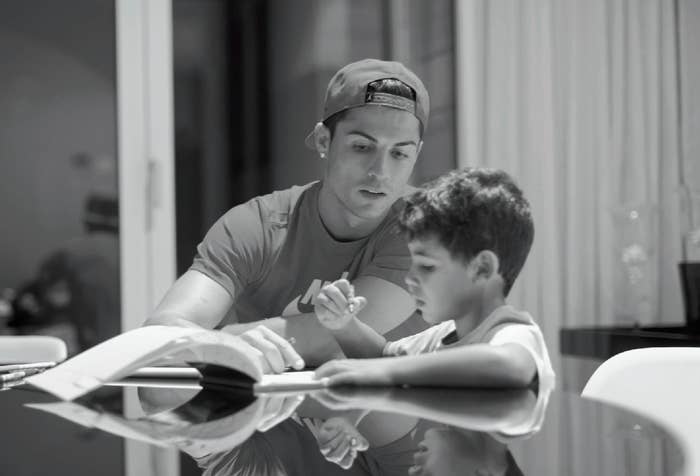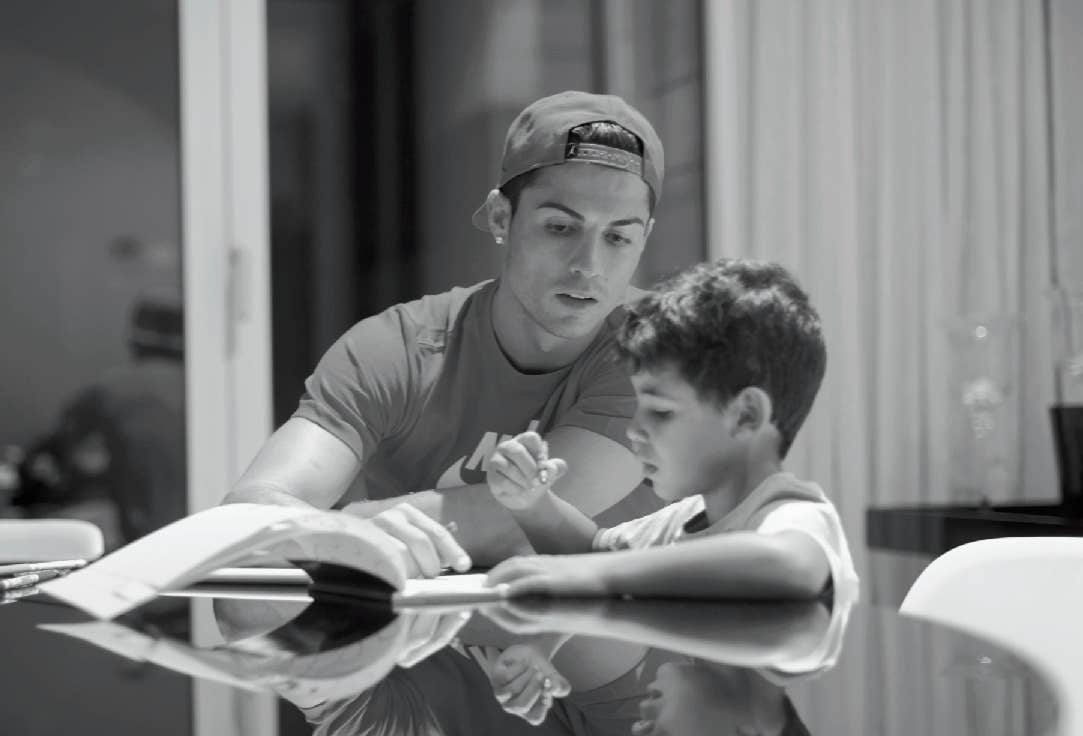
Cristiano Ronaldo is one of the few athletes on the planet who can command box office attention.
The Real Madrid superstar's life is the subject of a hotly-anticipated feature length documentary, which is released in cinemas for one day only on November 9th. The film follows Ronaldo through the greatest year of his career so far, winning the Champions League with his club, captaining his country in World Cup and beating his greatest rival to the FIFA Ballon d'Or.
At its best, the film is an intimate glimpse into the life of football's biggest star away from the gaze of supporters and the glare of the paparazzi. Ronaldo's devotion to his five-year-old son, Cristiano Jr, is the film's highlight and reminds us all that – despite his goalscoring numbers – Ronaldo is more man than machine.
We spoke with the director of Ronaldo, Anthony Wonke, about the enigma that is Jorge Mendes, Ronaldo's rivalry with Lionel Messi and life inside the bubble of football's greatest star.
Interview:Corey Pellatt

You’ve just finished a film about one of the world’s greatest ever athletes – are you actually a football fan?
I enjoy it and I watch football but I don’t come from a sports background. I don’t have an encyclopedic knowledge of the game and it’s actually one of the first things I said to Ronaldo when I met him, I said ‘I couldn’t name Real Madrid’s starting eleven, I don’t have that expertise’ and he got it – he said that’s fine, it’s not that important.
So what was your reaction when you found out this project was coming your way?
The first thing I had to do was find out which Ronaldo it was! When my agent told me it was the one who plays in Spain, I was more excited because a lot of sports films are testimonial – athletes agree to let cameras in once they’ve finished their career and need to keep an image going. It’s usually a nostalgic trip of their career…this is a different proposition.
This was access to, potentially, one of the world’s most famous and recognisable people and arguably the best player of the last ten years at a time when it could have been the biggest year of his career. As you also know, Ronaldo polarises a lot of people.
You made the film over the course of 2014 – taking in the World Cup, the Champions League final – but how much time did you actually spend with Cristiano Ronaldo?
When I had the first meeting with Universal Pictures, the idea was there’d be a couple of days to film Ronaldo for some interviews and the whole film would then be structured around that. We met Ronaldo just before the Champions League final and I thought, actually, he might engage with this film a bit more. He seemed really interested in it and he liked the idea of how we were going to try and explain him.
Then we started filming with Jorge Mendes at the Champions League final and we met Ronaldo’s family and friends. Word got back to Ronaldo of what we were trying to do and I’d intermittently see him, like at the World Cup, and we’d do interviews and get more filming done. He’s a perfectionist and loves attention to detail. There’s a part of him that clearly thought ‘if we’re going to do this, it needs to be a good film’. I said if you really want the film to be brilliant, you need to give us time…that’s what you need for an observational film, a long period of time to see an element of change in someone’s life.
How open was Ronaldo in dealing with of the more sensitive areas of his life for the film? There’s scenes dedicated to the mystery surrounding his son’s mother and his father’s battle with alcoholism…
This all comes from him. I kept our interviews until the very end of the filming process and those interviews are done without a camera. I’d fly out to his house in Madrid, we’d sit down in a room in his house, and we’d talk for an hour or more – he shared everything, there was nothing he wouldn’t talk about. Ronaldo’s very truthful and he likes the documentary genre, he wanted to go for it.
Did you ever notice a change in his behaviour when he was on film? He’s caricatured in the press as being pretty vain. Ronaldo is filmed all the time, there’s a love and hate relationship with the camera. We got to an award ceremony one night and the cameramen literally clustered in his face and we’re not just talking one, there’s ten cameras right in front of him with the flashlights on top…it’s really invasive. There’s paparazzi outside of his house all the time looking for him. He’s aware of that intrusion in his life but at the same time, because of that, when we were there with our camera, he was used to it.
He never played up to the camera and I said at the beginning, ‘I want to just observe you, I don’t want to ask what’s going on or anything like that…I just want to observe you on a day-to-day basis’. He’s not stupid – he’s a very clever guy – and he got it.

Ronaldo’s agent, Jorge Mendes, features in the film very heavily and he’s a bit of an enigma in modern football. What was he like to work with?
Jorge is great, I really like him – he’s a good guy, I think! What I found interesting about him is he’s just as intense and focused as Ronaldo. I think that’s why they’ve got on so well for such a long time, they’re both as hungry and ambitious as each other.
Some of the most memorable scenes from the film involve Cristiano’s bond with his son and how that differs from the relationship he had with his own father. Was it always your intention to showcase Ronaldo as the ‘family man’?
At the beginning you have ideas about the themes you want to explore and once you start piecing material together, you realise when you’re getting something strong.
In terms of research, I wouldn’t say I watched everything there is to watch about Ronaldo because there’s so much, but whenever anyone spoke about Ronaldo’s dad, they’d mention it as if it was a footnote – and I thought hold on a minute, there’s more to this! I mean his dad was an alcoholic and he had post-traumatic stress disorder from fighting in Angola – these are all big deals.
Now, Ronaldo surrounds himself with his family and he’s not the only one on this amazing journey, they’re on it too. They’re living this vicariously through him and that shapes their life.
It’s often said you should never work with animals or children, so with that in mind, how was it to deal with Cristiano Jr, who features in the film so heavily?
(Laughs) Junior’s great! He’s lovely. He took an active interest in the film and kids actually say the most profound things. Junior is a really good, centred, charming young boy.
There’s a great scene between Ronaldo’s son and Lionel Messi and the Ballon d’Or ceremony from last year, which humanises their rivalry in a way we haven’t seen before. What was your assessment of the relationship between Ronaldo and Messi?
I met Messi there and that scene is a great illustration of where their relationship is now. I think this rivalry is something that’s understandably created by the press but I think what’s good about the film is it challenges the expectations and perceptions people have about these two great rivals.
'Ronaldo' in cinemas for one night only on Nov 9 and available on DVD, BD and digital download the same day.


